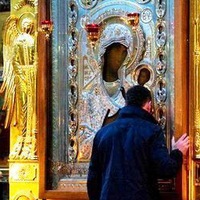Об обстоятельствах, при которых я читал Евангелие, я сейчас не буду говорить; но одна из первых вещей, которая меня поразила, когда я встретился с евангельским словом, словом, которое Бог говорит человеку, — это слова о том, что Бог сияет Своим солнцем на добрых и на злых, на благодарных и неблагодарных, на любящих и ненавидящих, что для Него все люди — Свои (Мф. 5, 44-46). Мы Ему можем быть чужими, но Он нам — свой; мы можем от Него отвернуться и оказаться предателями в самом последнем смысле слова, а Он останется верным до конца (до какого конца — мне еще было неясно тогда, потому что это было только начало евангельской повести; я потом открыл, какой это конец). И я помню, каким это было откровением. Откровение заключалось вот в чем: я окружен людьми, которых я всегда считал прирожденными врагами, опасностью для жизни, опасностью для цельности души; и вдруг оказывается, что этих людей любит Бог, как отец любит своих детей, — и меня тоже! Помню, я в первое утро после чтения вышел, смотрел вокруг себя с изумлением на всех людей, которые шли по улице, спешили на поезд, на работу, и думал: Какое чудо! Они, может, не знают, что они Богом любимы без разбора, а я это знаю, и они мне больше не могут быть врагами... Что бы они ни сделали по отношению ко мне или к кому бы то ни было — ни один из этих людей никогда не будет мне врагом; он может оказаться хищным зверем, он может поступить жестоко, он может поступить безумно, но я-то знаю, что у нас один и тот же Отец, что каждый из них — из нас — равно любим, и что нет врагов... Вам может показаться, что такая реакция, такой ответ души на этот короткий и простой отрывок из Евангелия — детскость, незрелость, — пусть; но я и сейчас думаю то же самое, после того как прошло сорок пять лет или больше. И это одно из самых основных открытий, которые можно сделать в Евангелии: обнаружить, что мы все для Бога — дети, свои; чужих нет.
Митрополит Антоний (Сурожский)
Митрополит Антоний (Сурожский)
The circumstances under which I read the Gospel, I will not speak now; but one of the first things that struck me when I met the gospel word, the word that God speaks to man, is the words that God shines with His sun on the good and on the evil, on the grateful and ungrateful, on loving and hating that for Him all people are His (Matt. 5, 44-46). We can be strangers to him, but he is ours; we can turn our backs on Him and turn out to be traitors in the very last sense of the word, and He will remain faithful to the end (to what end - it was still not clear to me then, because this was only the beginning of the gospel story; then I discovered what end it was). And I remember what a revelation it was. The revelation was this: I am surrounded by people whom I have always considered natural enemies, a danger to life, a danger to the integrity of the soul; and suddenly it turns out that God loves these people, just like a father loves his children - me too! I remember the first morning after reading, I went out, looked around with amazement at all the people who were walking along the street, hurrying to the train, to work, and thought: What a miracle! Maybe they don’t know that they are loved by God indiscriminately, but I know that, and they can no longer be enemies to me ... No matter what they do in relation to me or to anyone - none of these people will never be my enemy; he may turn out to be a predatory beast, he may act cruelly, he may act insanely, but I know that we have the same Father, that each of us - from us - is equally loved, and that there are no enemies ... to you it may seem that such a reaction, such a response of the soul to this short and simple passage from the Gospel - childishness, immaturity - let; but I still think the same thing after forty-five years or more have passed. And this is one of the most basic discoveries that can be made in the gospel: to discover that we are all for God — children, ours; no strangers.
Metropolitan Anthony (Sourozh)
Metropolitan Anthony (Sourozh)

У записи 9 лайков,
0 репостов,
321 просмотров.
0 репостов,
321 просмотров.
Эту запись оставил(а) на своей стене Вероника Вовденко





























